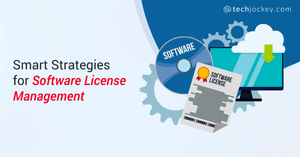What is License Management Software?
License management software is deployed by enterprises to track active & unused software, monitor the license status, send alerts for upcoming license renewals, and uninstall unlicensed software to avoid legal hassles. In short, license management software ensures license compliances and facilitates the optimum usage of different IT solutions across departments.
License management tool provides a complete record of software license agreements between your company and the vendors. It is critical for reducing the administrative burden associated with maintaining different software license types. The software does this by automating licensing tasks such as policy management, tracking usage status, handling license inventory and defining different licensing models.
Who are the Typical Users of License Management Software
Software developers, vendors & resellers: Software vendors have to manage different client accounts and create licensing models for them. Many software vendors also perform regular software audits for their clients to ensure that they are adhering to terms and policies.
Businesses as end-users: License management tools are used by businesses to track and monitor software licenses, their expiry/renewal dates, and the utilization across departments. Based on software usage reports, businesses can create the budget for software license upgrades and renewals.
Most Common Features of License Management Software
Licencing models: License manager can be used for creating license models based on different pricing strategies such as virtual machine licenses, mobile and network licenses, and trial licenses.
License policy management: Software asset management software lets you change or create terms & conditions of use within a product's license files along with updating software usage policies.
License inventory: License management portals provide license expiration dates, versions and numbers for auditing the status or usage of different software solutions.
Reporting & analytics: Software license managers offer an inbuilt dashboard for tracking the over or under-utilization of solutions procured by your organization. License management portals provide multiple report types for cases involving errors, data beaches, etc.
Managing license entitlements: Software asset management software can be used for managing licensed software rights aside from reallocating, revoking and assigning license entitlement rights.
Automated discovery: License managers identifies and tracks different software applications across departments, send alerts for over or under-utilization.
Tracking licenses: Track and maintain a centralized inventory of the total number of active/inactive software licenses with the software.
Monitoring licenses: Check for the licenses bought and understand their working through the usage metrics provided by software asset management software.
Blocking non-business apps: License managers let you block non-business apps in a network to avoid legal or technical complications.
License audits: Perform regular software audits to avoid penalties due to the use of unauthorized business solutions. Accordingly, you can renew software licenses as the due date arrives.
Benefits of License Management Software
1. Automating IT asset management: License management systems automatically track the software usage metrics like licensing inventory, utilization of software applications across departments, expiry dates, license types, etc.
2. Reducing subscription costs: You can use license compliance software for identifying underutilized software and renew or upgrade license types accordingly.
3. Lowered risk of non-compliance: Software license management software conducts automated audits to check that your organization is compliant with end-user licensing agreements.
4. Regular notifications and alerts: Get regular notifications and alerts regarding the overuse of software applications, their license expiration dates and unauthorised use.
5. Easy compliance management: Track the license inventory and easily maintain compliances by managing the information related to non-adherence of policies.
6. Preventing unauthorised access: Software license compliance software prevents unauthorized access and keep your software applications secure from virus or malware attacks, online threats and more.
7. Balanced software budgeting: Create a balanced software budgeting plan and choose the best software licenses and plans within your budget.
8. Visibility into installed apps: Get complete visibility into applications installed by running regular software license inventory scans.
9 Customized task lists: Software license managers can be used for creating customized task lists so that you can handle with ease all your requirements for tracking and managing software applications.
What is the Average Cost of License Management Software in India
The price of license management solutions in India depends whether you are opting for the subscription model or one-time upfront costs.
Starting Price: $, Advanced: $$, Premium: $$$ with free trial version
How to Find a Good License Management Software
Software suite or standalone tools: Software license managers can be deployed either as stand-alone solutions or as software suites. Software suites offer additional features like software auditing and depreciation management. Assess the budget and what your key requirements are to select the right license management tool.
On-premises vs cloud-based: Depending on your IT infrastructure, choose the correct deployment model. Cloud-based license management solutions compared to on-premises ones are easy to set up and less costly. On-premises license portals however provide more options for customization and data security.
Traditional licensing or SaaS subscription: SaaS or traditional solution, this would depend on the deployment model (on-premises or cloud-based) you are using. Cloud-based license management systems work with SaaS subscriptions on monthly/quarterly or per annum basis. Traditional license management tools often come with one-time upfront costs.
Automated notifications: Check if the license management portal offers automated notifications for tracking the total number of licenses and upcoming license expirations and renewal dates.
Data security: In case you are using a cloud-based model, ensure that the right to privacy and data security standards are clearly defined. It is necessary to ensure that the cloud solutions provider doesn't misuse the data.
Market Trends for License Management Software
Statista report has indicated that the total number of software developers would reach over twenty-eight million by the year 2024.
The market for software development is booming and more businesses are opting for software licenses to atomate different processes. However, managing software licenses is a tedious task for both software buyers and developers. Software developers have to create a record of their clients, software license types, expiry dates, etc. At the same time, businesses have to ensure license compliance for software solutions used across different departments.
Let us have a look at the key trends guiding the market for licensing software.
Mobile-based license management system: Businesses are currently looking for such license management solutions that can be accessed on mobile for monitoring and documenting software licenses active across your company. Software license management is critical for handling incidents, configurations, inventory, asset correlation and lifecycle.
Digital transformations driving the demand for license management solution: Organizations large and small, government and private sector ones are recognizing the importance of software solutions. And as the demand for automation solutions increases, there is an inevitable need for license management tools to ensure compliance with vendor agreements.
Vendor supported software audits: Software licensing and SAM (software asset management) has been helping organizations mitigate many software vendors like IBM, Adobe, Microsoft and SAP to helps its clients stay compliant with software licensing terms. If you are also using any of their software applications within your organization, you are likely to get vendor supported software audits.
What are the Popular Deployment Options for License Management Software
License management systems provide the following two choices to their end-users when it comes to their deployment types:
Cloud-Based License Management Software- Cloud-based deployment works on the model of recurring payment, either annual or monthly. You don't have to do any in-house installation as the software is accessible online via a web browser. However, payment has to be done for updates, technical support, annual maintenance, and hosting.
On-Premises License Management Tools- On-premises license management tools are available with one-time fee and are accessible to one user at a time. You own an on-premise solution and its hosting and maintenance is completely your responsibility.


















